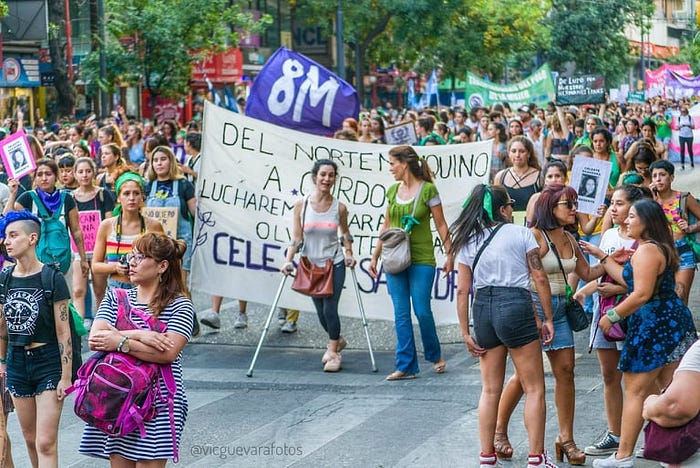By Virginia Ossana. First published on Medium.

The Polish Constitutional Tribunal’s ruling to further restrict abortion laws in Poland has kept me thinking and reflecting a lot. Not only on the right to abortion per se, but on the feminist movement as a whole and how we still have a long way to go to fully include women with disabilities.
Following the news and seeing the protests rage in Warsaw instantly took me back to August, 2018, when in my home country, Argentina, we were taking to the streets to show our support for a bill that would make abortion legal, safe and free throughout the country. Women’s marches in Argentina are generally very happy events, filled with music, dancing and glitter, and lots and lots of people.
In one of those marches, there were literally hundreds of thousands of us in the street. I was overjoyed to be a part of it all, I felt alive, part of something bigger than myself and truly hopeful that a change was underway. Until…

Yes, unfortunately, there is an “until…”
Until I asked the person standing in front of me if they could make a bit more space for me. I didn’t have enough room to put my crutches down. I could feel my balance starting to fail me, and needed to rest the weight of my body for a second. I was tired, so I asked them.
And what happened next I am still trying to process.
They looked at me, or rather at my legs, and said “well, what are YOU doing here? Why did you come if you knew it was going to be like this?” I was shocked at the time and the only thing I could say was “I have as much right to be here as you”, then left. That was a tough moment, and for a second, I thought “Oh well, it’s just another day. Just let it slide and go home.”
“I have as much right to be here as you.”
I felt humiliated, but, mostly, I felt angry. I could not believe that someone in the same movement that advocates for equal rights was, right then and there, implying that as a woman with a disability my place was not at the march. The thing is I am a woman, too, so I should be everywhere where our rights — particularly our sexual and reproductive rights- are being discussed and decided.
But then, when I actually was home, and I had talked about it with other friends in the disability community, I realized that as an advocate -both for myself and for other women with disability- letting it slide was the worst thing I could do.
“The thing is I am a woman, too, so I should be everywhere where our rights — particularly our sexual and reproductive rights- are being discussed and decided.”
That experience became a reminder of all the work that lied ahead of us, and it is a blatant example of how ableism permeates every space, even those that are supposed to be safe spaces. When you think about it, though, you may say “I would never say something like that”. There are, however, more subtle ways in which women with disabilities are being excluded from feminism, and those ways –being harder to notice- are even more dangerous. Think for example of the number of feminist events being held on upper floors and having no elevators, accessible bathrooms, close captions, sign language interpretation and so on, and think of how often we take that inaccessibility as the norm.
“We need accessibility, yes, but we also need an attitudinal shift that does not question our place in the movement.”
In the end, I didn’t let that comment slide. I took it and the anger it sparked in me and I turned them into the fuel that lights my activism today. I kept going to the marches. I still do, even when they are not accessible, to show that we exist, that we care, and that those are our rights, too.
I still fight for sexual and reproductive rights in general and for abortion rights in particular because the bill that would make abortion legal, safe and free in Argentina has yet to be passed, and because countries like Poland, instead of amplifying sexual and reproductive rights, are further restricting them.
If feminism is to achieve equality for all, it cannot afford to leave women with disabilities, –one fifth of women worldwide– behind. We need accessibility, yes, but we also need an attitudinal shift that does not question our place in the movement.
There is a lot of work to do, and we are here to do it.
Together, as it should be, because we are women, too.
______________________________________________________
*About the author
Virginia is a women’s rights and disability rights advocate. Originally from Argentina, she has moved around quite a bit for the last decade and now lives in the UK. She enjoys reading, writing and having her coffee with three sugars. Some might say she likes her sugar with a bit of coffee.
She is a member of the Latin American youth movement META- Movimiento Estamos Tod@s en Acción and is also the Communications and Programs Advisor at Women Enabled International.
